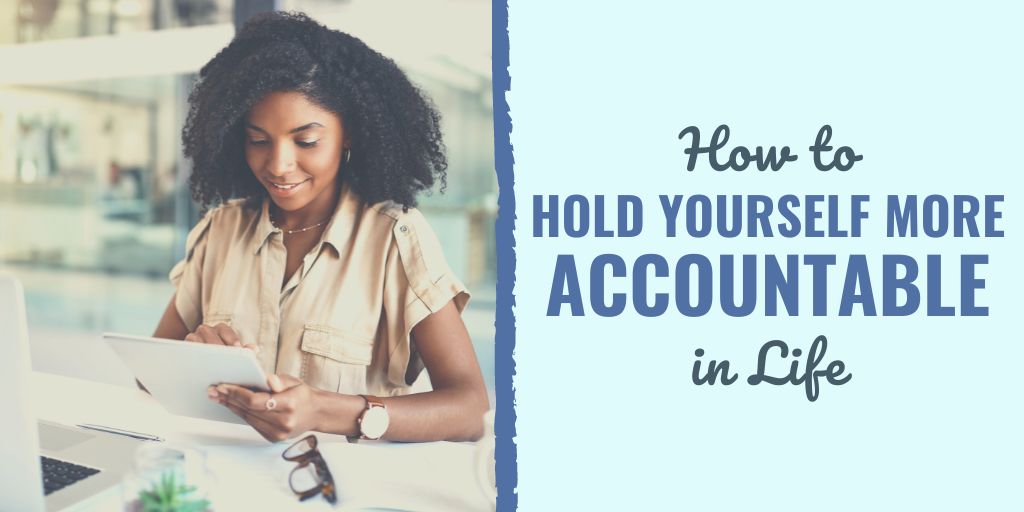There might be affiliate links on this page, which means we get a small commission of anything you buy. As an Amazon Associate we earn from qualifying purchases. Please do your own research before making any online purchase.
Some principles withstand the test of time–foolproof ideas that kick start the journey to success and put you on the road to a more fulfilling, healthier, more conscious life.
First and foremost of these is accountability.
But what exactly is accountability?
Accountability is a condition in which you take responsibility.
- An accountable person understands that the overall quality of life is down to you and you alone.
- It doesn’t matter who you are, where you started, or what advantages and disadvantages you were born with.
- Accountability allows you to operate at your full potential.
Why?
Because you are taking ownership of your goals and problems.
This can seem daunting, but in reality, it is incredibly empowering.
You simply cannot operate at your potential if you blame something or someone else for where you currently are in life.
Why Accountability Creates Success and Irresponsibility Creates Failure
To understand why accountability works, you need to understand its opposite–irresponsibility, otherwise known as playing the blame game.
Society loves irresponsibility. Think of the various phrases you might hear regularly:
- “I can’t find a job because the economy is in shambles.” Maybe you didn’t take the time to learn new skills or build a network within your industry.
- “My health is poor because the food industry contaminates everything with unhealthy fats and excess sugar, salt, etc”. – Have you used this as an opportunity to educate yourself about nutrition and food labels?
- “The bank foreclosed on my house. It’s their fault, because they said I qualified for a loan that I couldn’t afford.” – Did you take the time to fully understand your finances and figure out how much you can afford to pay each month?
- “I’m too busy/tired to exercise.” – Can you carve out 5 to 10 minutes a day for some simple calisthenics or a brisk walk?
- “I like sugar/cigarettes/(insert addictive substance here) too much to quit.” – Addictions can cripple you, but there is always help available to anyone who wants to quit.
These excuses are heard frequently, and they all have one thing in common: They take control out of your hands and put it into someone or something else.
They can be plausible and understandable, but that doesn’t change the fact that you can always do something about it.
There are dozens of conditions and groups of people that can negatively impact your success:
- Government
- Economy
- Parents
- The area you grew up in
- Friends
- Family
- Religion
- Coworkers
All of these and more can hinder you, but the only person who can overcome them is you.
Accountability Starts with Change
The results you see now are a direct result of habits and actions. Change these and you will change your results.
If you want to improve, think about how the choices you have made have led you to where you currently are now.
How have these choices helped or hindered you?
The first step in accountability is taking ownership of yourself.
This means that you need to look at your current habits and decisions, and change them if necessary.
Intrinsic vs Extrinsic Motivation
Without motivation, change can be difficult.
Motivation comes in two flavors: intrinsic and extrinsic.
Intrinsic motivation is all about feeling competent, satisfied, and internally motivated.
An example is going to the gym because you enjoy the feeling that exercise gives you.
Extrinsic motivation is all about goals, rewards, and achievement.

An example is going to the gym to lose x amount of pounds or lift x amount of weight.
When changing your habits, think about why you are doing it.
- If you want to earn x amount of money every month, then you’re doing it for extrinsic reasons.
- If you’re taking action because you want to be more independent and live a more satisfying life, you’re intrinsically motivated.
Keep in mind which one you are. This is your why, and it’s important to hold onto it.
An Accountability Action Plan
While knowledge about accountability is great, application is where the rewards are found.
Applying accountability is much more straightforward if you have a roadmap to follow.
Make a Commitment
Decide what you want to achieve. To be accountable, you need something to be accountable to.
This is your steering wheel. It keeps you honest and helps you know if you’re going the right way.
One way to commit is to ask yourself some questions:
- Are your day-to-day decisions and actions helping or hindering you?
- Are you listening to constructive criticism from people who care about you?
- Are you taking stock of your mistakes and learning from them?
- Are you being honest and genuine with yourself and others?
- Are you a reliable person? Would you count on you if you didn’t know yourself?
The essence of commitment is sticking with something until the very end. Try to minimize wavering and “umming and ahhing.” Stay the course and stick to your chosen path and goals.
Simplify and Gain Clarity
Break your objectives down to the point where there is no room for interpretation about what the outcome should look like.
When stating what your goals or objectives are, be clear about what you’re expecting from yourself.
This isn’t necessarily for other people (although they’ll likely find it helpful). This is all about removing any ambiguity for yourself.
If you’ve said that you’re going to get fit, and the process for that is going to the gym four days a week, you’ve set a commitment and an expectation.
Don’t set yourself a list of massive commitments with vague, ambiguous, open-ended goals. This makes it harder to be accountable in life.
Create SMART goals
SMART stands for:
- Specific
- Measurable
- Attainable
- Relevant
- Time-bound.
With these goals, you take out all of the guesswork out of the process.
Specific means it has a narrow focus. “I want to be a better person” is not a goal, it’s a prayer. “I want to improve my stress management skills” is much better.
Measurable means that you have some way of knowing if you’re getting closer or further from your goal. For stress management, this could mean attending a course and getting a certification, or it could mean attending regular meditation sessions.
Attainable means realistic. Improving stress management doesn’t mean that you’re trying to be the next Dalai Lama or Gautama Buddha. It could be something as straightforward as lowering your blood pressure.
Relevant means that the goal is related to your broader aims and objectives. Learning to manage stress better, for example, can help with physical and mental health. It can also help you succeed more in the long run.
Time-bound means giving yourself a deadline or ensuring that you check in with your progress every month.
SMART goals help with accountability by breaking everything down into steps.
If you stick to the process of achieving a goal, then you are being accountable to yourself.
This video provides a quick overview of SMART goals and then show three examples for each of the seven areas of your life.
Stop Pointing Fingers
Regardless of how wonderful you are, setbacks can and will happen.
When they do, your response can make or break your progress. Do you complain about who is at fault, or do you see what can be learned from the setback?
That being said, it is important to end self-blame. If you’ve goofed up, there’s no need to self-flagellate and feel too bad.
This doesn’t make you more accountable, it just makes you fixate more on your flaws than necessary. It is much better to reflect on what went wrong and then figure out how you can avoid the same mistakes in the future.
Practice
Accountability is like a skill: You need to put the time in to get the benefits out of it.
A good way to do this is to think of yourself as a manager for your own life. Are you managing your life well? Are you using your time and resources well? Is the company (you) flourishing?
Looking into how you spend your time is another good way to practice accountability. Do you spend time reading or learning about the skills you want to develop or the subjects you want to learn about?
Do you spend any time in the gym?
Do you spend time budgeting or looking at your finances?
Looking at things in this way exposes gaps in your accountability and helps you think of better ways to get things done.
Try an Accountability Partner
Finding someone who can help you stick to your goals can be a game-changer.
If you struggle to do what you say you’re going to do, then you might need someone else to help you out.
This is where an accountability partner comes in. They can be a peer, a partner, or a friend who checks in to ensure that you’re doing what you said you were going to do.
You both focus on each other's success. Instead of feeling like a teacher is scolding you for misbehaving, you’re on a more even footing.
A good accountability partnership focuses on coaching and supporting each other. It is not about judgment.
A good accountability partner is someone who you can talk to about the challenges you’re facing, and get honest advice from.
Watch the video below to learn the specific steps to take in order to succeed with an accountability partner.
Accountability Benefits
Following a plan makes it much easier to enjoy the benefits of accountability in your life, of which there are many!
Benefits can help you stay motivated, so here’s what you can expect to gain from being more accountable in your life.
- You observe your own life: When you place your own life under a microscope, you notice what you’re doing well and what you’re doing poorly. This knowledge can be transformative when it's self-realized.
Socrates said “An unexamined life is not worth living,” and this is exactly what he meant.
- You become more honest with yourself and others: When you become more accountable, it’s much easier to see where you’re failing. This can hurt at first, but it’s invaluable information in the long run.
When you understand your strengths and weaknesses, you understand exactly where to put your focus and attention.
- You force yourself to follow through on commitments: One common problem is starting a new project and then abandoning it when the initial feelings of excitement go away. A large portion of success is just sticking with something until you’re good at it.
- It keeps you grounded in reality: Focusing too much on goals and dreams stops you from taking the necessary actions to achieve them.
Accountability is all about being focused on your day-to-day actions and commitments. This keeps your eyes on the road and helps you stay focused on the everyday actions that get you to where you want to be.
Final Thoughts on Accountability
Accountability isn’t some new and sexy revolutionary idea, but it’s almost impossible to overstate just how valuable it can be to anyone on the path to a more independent and fulfilling life.
Being accountable is all about taking an honest look at where you are now versus where you want to be, and then keeping tabs on yourself to ensure you’re taking the actions you need to get there.
And if you're looking for more articles on accountability, be sure to check out these blog posts:


